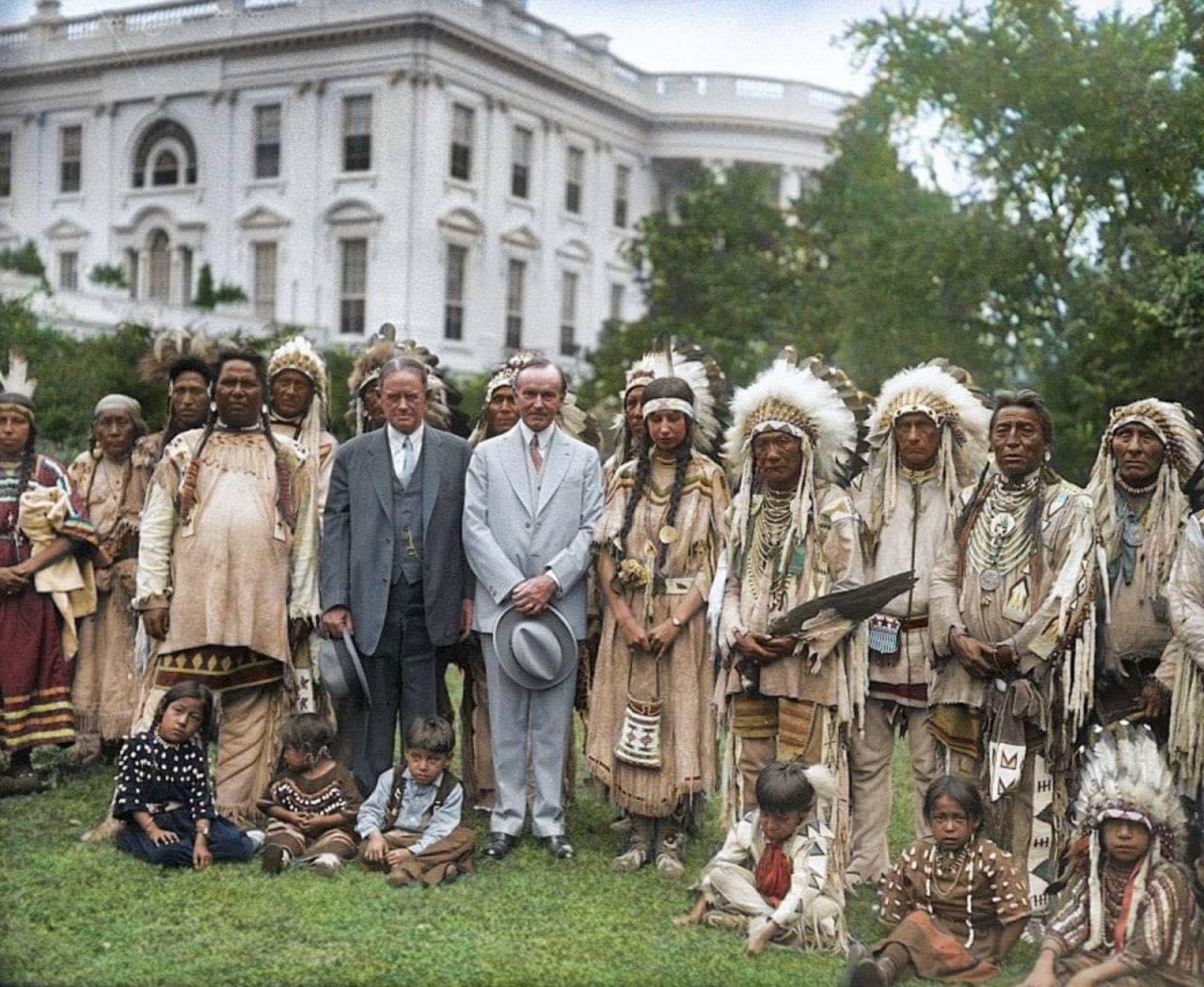
- Details
- By Native News Online Staff
One hundred years ago this month, the Indian Citizenship Act of 1924, also known as the Snyder Act, granted citizenship to all Native Americans born within the territorial limits of the United States. President Calvin Coolidge signed the act into law on June 2, 1924, the legislation was the culmination of decades of efforts by both Native American advocates and progressive reformers to secure recognition and rights for Indigenous peoples within the American legal framework.
Though the Fifteenth Amendment, passed in 1870, granted all U.S. citizens the right to vote regardless of race, it wasn't until the Synder Act that American Indians and Alaska Native Americans could enjoy the rights granted by this amendment.
Prior to the Indian Citizenship Act, the status of Native Americans in the United States was complex and often contradictory. Native Americans were considered inhabitants of sovereign nations by treaty agreements, yet they were also under U.S. jurisdiction and often treated as wards of the state. The Dawes Act of 1887 was an earlier attempt to assimilate Native Americans into American society by dividing tribal lands into individual allotments and offering citizenship to those who accepted these allotments and adopted "civilized" ways. However, this approach led to a significant loss of tribal land and did not result in widespread citizenship.
The push for broader citizenship rights gained momentum during World War I. Approximately 12,000 Native Americans served in the armed forces during the war, despite not being recognized as citizens. Their service highlighted the paradox of their contributions to the nation while being denied the full rights of citizenship. This discrepancy fueled public and political support for extending citizenship to all Native Americans.
The Indian Citizenship Act of 1924 was relatively straightforward in its language and intent. It stated: "Be it enacted by the Senate and House of Representatives of the United States of America in Congress assembled, That all non-citizen Indians born within the territorial limits of the United States be, and they are hereby, declared to be citizens of the United States: Provided, That the granting of such citizenship shall not in any manner impair or otherwise affect the right of any Indian to tribal or other property." This clause was crucial as it ensured that citizenship did not entail the loss of tribal affiliations or rights to communal property, a significant concern among Native American communities.
Despite its passage, the act did not immediately translate into equal rights or integration for Native Americans. Many states continued to impose barriers that effectively disenfranchised Native Americans, such as literacy tests, poll taxes, and other discriminatory practices that were also used against African Americans. It wasn't until the Voting Rights Act of 1965 that many of these obstacles were finally dismantled.
Moreover, the granting of citizenship did not address broader issues of social, economic, and political inequality faced by Native Americans. Poverty, lack of access to quality education, and inadequate healthcare continued to plague many Native American communities. Additionally, the federal government maintained policies that undermined tribal sovereignty and self-determination.
The Indian Citizenship Act of 1924 was an important step in recognizing the legal and civic status of Native Americans, but it was far from a panacea for the myriad issues they faced. It highlighted the complexities of integrating Indigenous peoples into the broader national framework while respecting their unique cultural and communal identities. The Act remains a key historical event, symbolizing both progress and the ongoing struggle for Native American rights and sovereignty within the United States.

More Stories Like This
Native News Weekly (August 25, 2024): D.C. BriefsUS Presidents in Their Own Words Concerning American Indians
Federal Judge Orders ICE to Halt Use of Pepper Spray, Arrests of Peaceful Protesters in Twin Cities
Tunica-Biloxi Cultural Leader John D. Barbry Walks On
Next on Native Bidaské: Federal ICE Activity in Minneapolis: Ruth Buffalo’s Perspective
Help us defend tribal sovereignty.
At Native News Online, our mission is rooted in telling the stories that strengthen sovereignty and uplift Indigenous voices — not just at year’s end, but every single day.
Because of your generosity last year, we were able to keep our reporters on the ground in tribal communities, at national gatherings and in the halls of Congress — covering the issues that matter most to Indian Country: sovereignty, culture, education, health and economic opportunity.
That support sustained us through a tough year in 2025. Now, as we look to the year ahead, we need your help right now to ensure warrior journalism remains strong — reporting that defends tribal sovereignty, amplifies Native truth, and holds power accountable.
 The stakes couldn't be higher. Your support keeps Native voices heard, Native stories told and Native sovereignty defended.
The stakes couldn't be higher. Your support keeps Native voices heard, Native stories told and Native sovereignty defended.
Stand with Warrior Journalism today.
Levi Rickert (Potawatomi), Editor & Publisher


